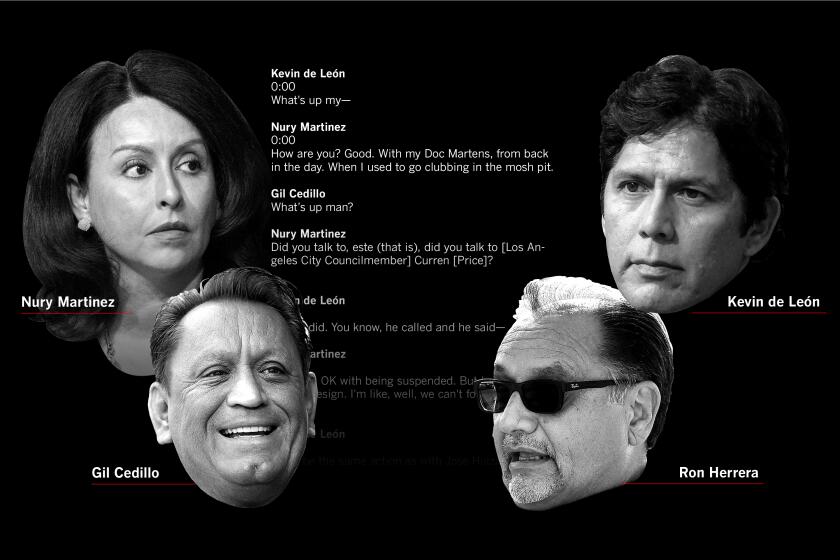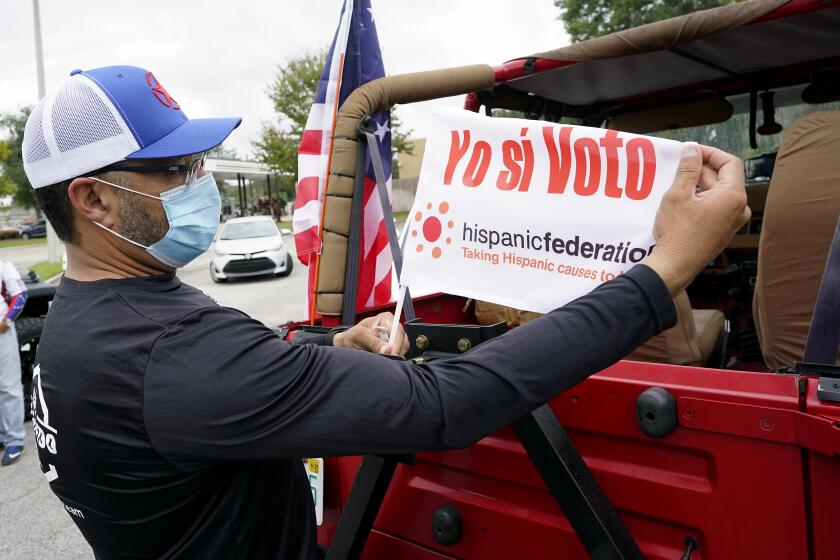Column: A year after the City Hall tape leak, where will Latino political power in L.A. go?
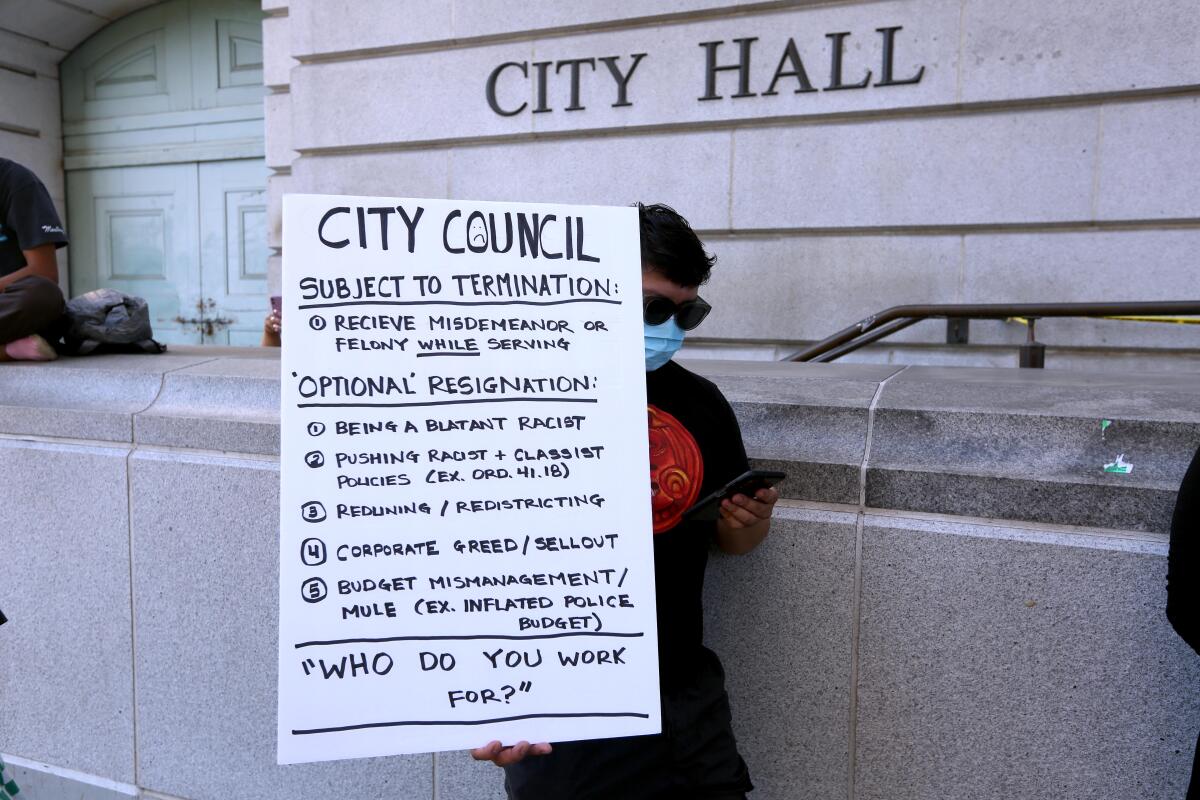
On a Tuesday morning in the fall of 1998, I waited in line at a polling precinct at Manzanita Park in Anaheim. I was 19, voting for the first time, and motivated by ethnic pride to do so.
Four years earlier, Californians had overwhelmingly passed Proposition 187, which sought to make life miserable for undocumented immigrants. It spurred my era of Latinos to get involved in local politics and fight for a democracy where people who looked like us would represent “us.”
I admired from afar what was going on in Los Angeles, where crusading politicians with last names like Molina, Polanco, Alatorre, and Alarcón fought for their working class constituents and inspired Latinos across the state. They were on my mind at Manzanita Park as I leafed through an election guide, searching for a Latino candidate — any Latino candidate — to vote for.
That person was Alexandria Coronado. She became the first Latina elected to the Anaheim Union High School District board of trustees. A year later, she voted alongside the board’s Republican majority to pass a resolution that sought to sue Mexico for $50 million for educating the children of illegal immigrants.
I was there at the meeting, disgusted with her vote on the resolution and my vote that helped her get on the board. Then came a surprise: The sole dissenting trustee was LaFrance “Slim” Terrell, a Missouri native and my former principal at Sycamore Junior High. From the dais, he ripped up the resolution and said to cheers from the room, “There’s no reason for it, no need ... to come up with something this divisive.”
That lesson about the limits of identity politics immediately came to mind the morning of Oct. 9 last year, when my editor asked if I could listen to a secretly recorded conversation. I heard four of the biggest names in L.A. politics, names I had once held in esteem as Latino champions, use racist and demeaning language to disparage just about everyone in the name of defending and expanding Latino political power.
A bombshell recording has thrown L.A. politics into chaos. What was really being discussed? L.A. Times reporters and columnists pick it apart, line by line.
City Council President Nury Martinez, Councilmembers Kevin de León and Gil Cedillo, and L.A. County Labor Federation head Ron Herrera griped that Latinos — who make up about half of the residents in L.A. and L.A. County — didn’t have enough representation in government, while other groups — especially Black voters — had too much of it. They cursed about this. They disparaged colleagues who they felt stood in the way of Latinos. They whined about perceived affronts to “us.” They laughed at the expense of Black children and Oaxacans.
Mostly, they plotted how to game 2021’s council district redistricting process and recruit candidates so that Latinos could get more council members and right what they perceived were historical wrongs.
“Look back, and what have any of them done for Latinos?” Herrera said, referring to non-Latino politicians. “And what are they going to do moving forward in the city? ... The way I see it, all of the seats are Latino.”
“We’re in a different spot now than we were 25 years ago,” Cedillo replied. “The thing for us is to exercise our power.”
“Why are people f—ing with us?” Martinez said later in the recording. “It’s always the case. We don’t get involved in anybody else’s neighborhoods.”
“It’s not [about] us,” De León claimed, talking about their planned machinations. “It’s for Latino strength for the foreseeable future.”

A year later, the hour-plus conversation still shocks with its nastiness and continues to cast a noxious cloud over Los Angeles and beyond. Martinez and Herrera stepped down soon after its release; Cedillo served out his term after losing to Eunisses Hernandez; De León is running for reelection in 2024. The four remain political pariahs in large swaths of the city for their role in the scandal.
Yet the main issue that drove their discussion — where does Latino political power stand in Los Angeles? — remains as vital and vexing to the future of L.A. as ever.
It has loomed over the city ever since Edward R. Roybal became the first Latino council member in modern times in 1947 and planted the seeds that turned the Eastside into a model for Latino political power. It fueled the politicians who came of age in the cauldron of the Proposition 187 years, like Cedillo and De León, that turned California and Los Angeles into the deep-blue political havens they are today. A Latino political identity helped people like Martinez to win elections in areas like the eastern San Fernando Valley, which became majority Latino long before its elected officials looked like the population that they served.
But this representation-as-salvation strategy is increasingly rejected by the newest wave of Latino leaders as not just imperfect to push L.A. forward, but also antiquated and even dangerous — and the leaked tape served as proof.
The 2020 election confirmed that Latinos aren’t a monolithic voting bloc. They exercise power in many venues, with a variety of objectives.
For Councilmember Hugo Soto-Martínez, they “showed the poison of identity politics and how it could be weaponized, and its many shortcomings.” He won in a majority-Latino district last year by following Hernandez’s example and running a class-conscious campaign that didn’t shy away from his Mexican background but never put it in the forefront. “If we don’t recognize that in order to change our economic system in a positive way, we’re going to continue to fight each other on a sinking ship,” he said.
“We’ve become so infatuated with numbers that demography becomes an anchor,” said Alberto Retana, head of Community Coalition. The South L.A.-based nonprofit counts Mayor Karen Bass and Councilmember Marqueece Harris-Dawson as former leaders. In the tape, De León said the group — commonly referred to as CoCo — was trying to “f—“ him politically. “It was never meant to be the end goal,” Retana said. “If we focus on that, we’ll just continue to circle the wagons and not advance anywhere.”
Fernando Guerra, director for the Center for the Study of Los Angeles at Loyola Marymount University, has tracked the rise of Latino political power for decades. He thinks the leak sounded like the participants “were talking 20 years ago, instead of talking about how L.A. should be for the next 20 years.”
“This is tough to comprehend, but Latinos are overrepresented in L.A. politics,” he continued, pointing to the liberal-progressive compass that has governed L.A. politics over the last generation. “There is no exclusion of Latinos in L.A. politics because the Latino agenda is L.A.’s agenda.”
But Guerra also acknowledged that saying Latinos don’t need Latinos to represent them isn’t a message many Latinos want to hear.
“Oftentimes, many Latino activists think that creating space for others come at their expense. They’ll say, ‘Hey, that’s great, that’s beautiful. But what about our representation? We agree with that, but not here.’
“That,” he concluded, “is an ethnic pitfall.”
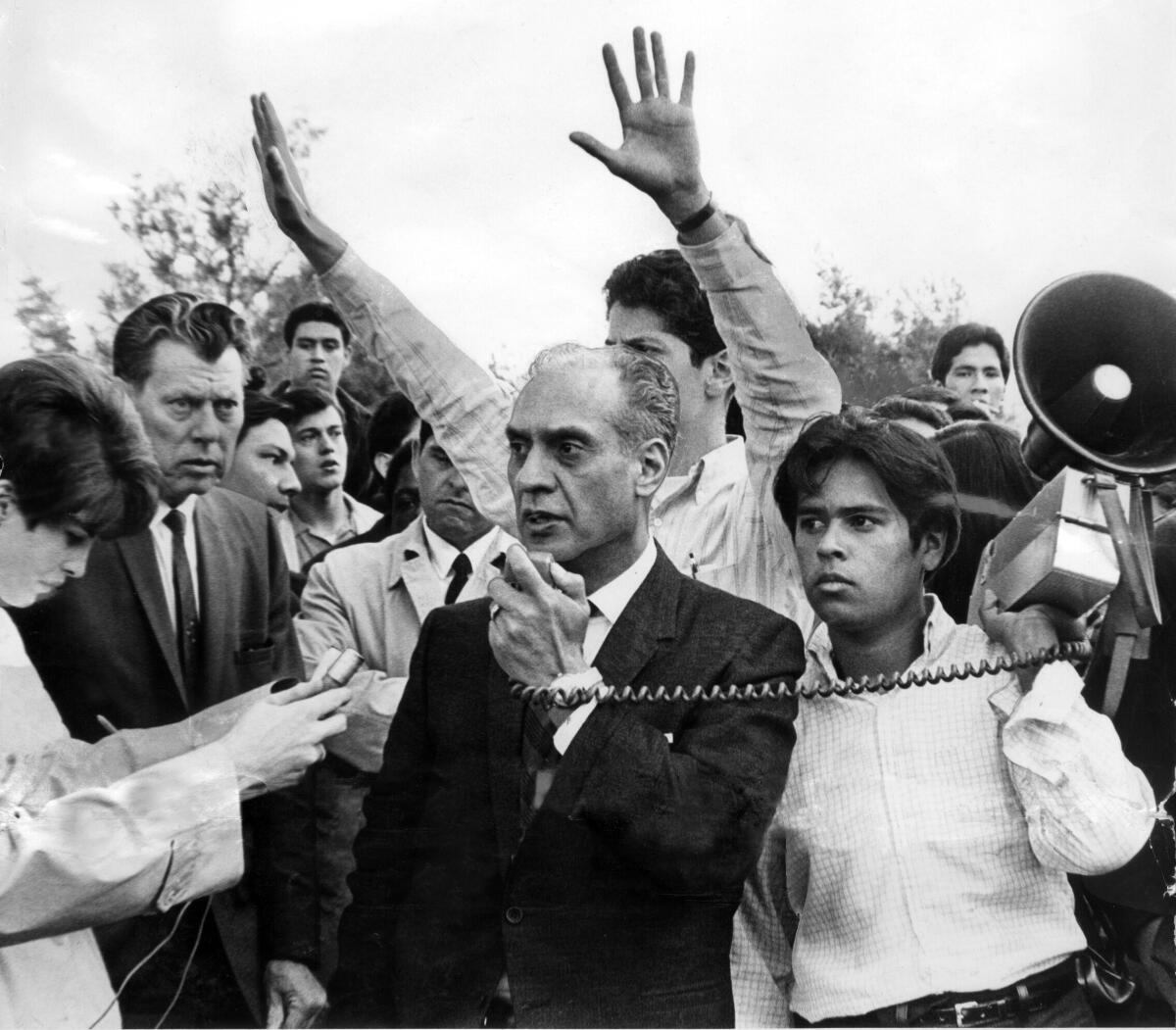
I didn’t pay close attention to L.A.’s Latino political scene until last year, when I covered the downfall of Sheriff Alex Villanueva and the leak fiasco. Seeing it up close has been a revelation — and mostly a dispiriting one.
Latinos have power in L.A., for sure. They hold three of the four most important positions in criminal justice: City Atty. Hydee Feldstein Soto, Dist. Atty. George Gascón, and L.A. County Sheriff Robert Luna. One of California’s U.S. senators is Alex Padilla, a Mexican American from the San Fernando Valley who was the first Latino to serve as City Council president. In southeast Los Angeles County, Anthony Rendon just finished his tenure as California’s second-longest-serving speaker of the Assembly, while former South Gate Assemblymember Hector De La Torre is the second-longest-serving member on the powerful California Air Resources Board.
But outside of those roles, Latino political power in L.A. is scattershot and riven with rivalries — it’s “Game of Thrones” with cumbia and tequila shots, caudillo vibes and huipil style. Fiefdoms prefer to fight within themselves instead of ally with other parts of the city, even as life becomes harder for Latinos.
Players in this game have long complained that Latino politicians suffer too much scrutiny by outsiders for things that all politicians do. My response: And that’s bad why?
As the 2024 election creeps up, it’s time to examine what Latino political power has wrought upon L.A., for better or worse.
For the next couple of months, I plan to write about this topic by focusing on four case studies. Through the series, I hope people can better understand the stakes for the future of Latino political power, which Retana said finds itself at “a fork in the road. Do we want to focus on representation or transformation?”
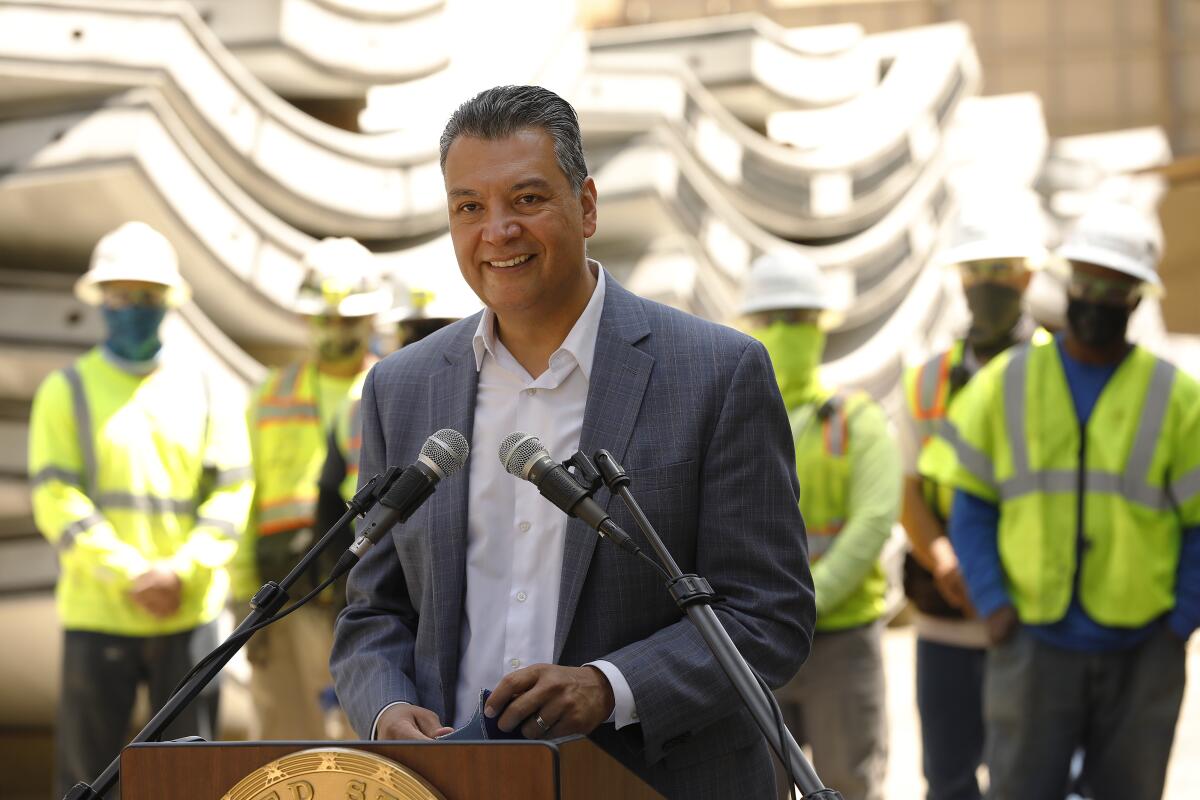
The most famous example is the Eastside. It’s a place that continuously produces outsize politicians, too many who have fallen into scandal. The race for De León’s seat — which includes two Assembly members and former allies of his, Wendy Carrillo and Miguel Santiago — promises to be the latest bruising campaign in an area notorious for them, a never-ending novela in which residents play perpetual pawns.
Up the 5 Freeway, the San Fernando Valley has offered a different way forward. Through a remarkable, decades-long campaign, Latinos there — almost all connected by a shared pedigree of high school, college, nonprofits, working on one another’s campaigns, or a combination of all four — have won seat after seat over the last 30 years. As a result, the northeast San Fernando Valley has become as important a locus of Latino political power as the Eastside.
Latino representation is something long pined for in South Los Angeles, the historical heart of Black L.A. that is now nearly two-thirds Latino. Latino candidates have tried and failed to win races for years in a landscape where Latino activists whisper that Black political leaders should move out of the way, while Black residents fret about a Latino takeover that will leave them behind. This zero-sum game has young candidates asking: why not someone who equally represents both?
Then there’s southeast Los Angeles County, a collection of small cities where Latinos have dominated city councils since the late 1990s but where that power became synonymous with corruption. A new generation of born-and-raised leaders in SELA — an acronym for the region popular with young activists — has emerged and united to seek regional power from boards and institutions that have long ignored them.
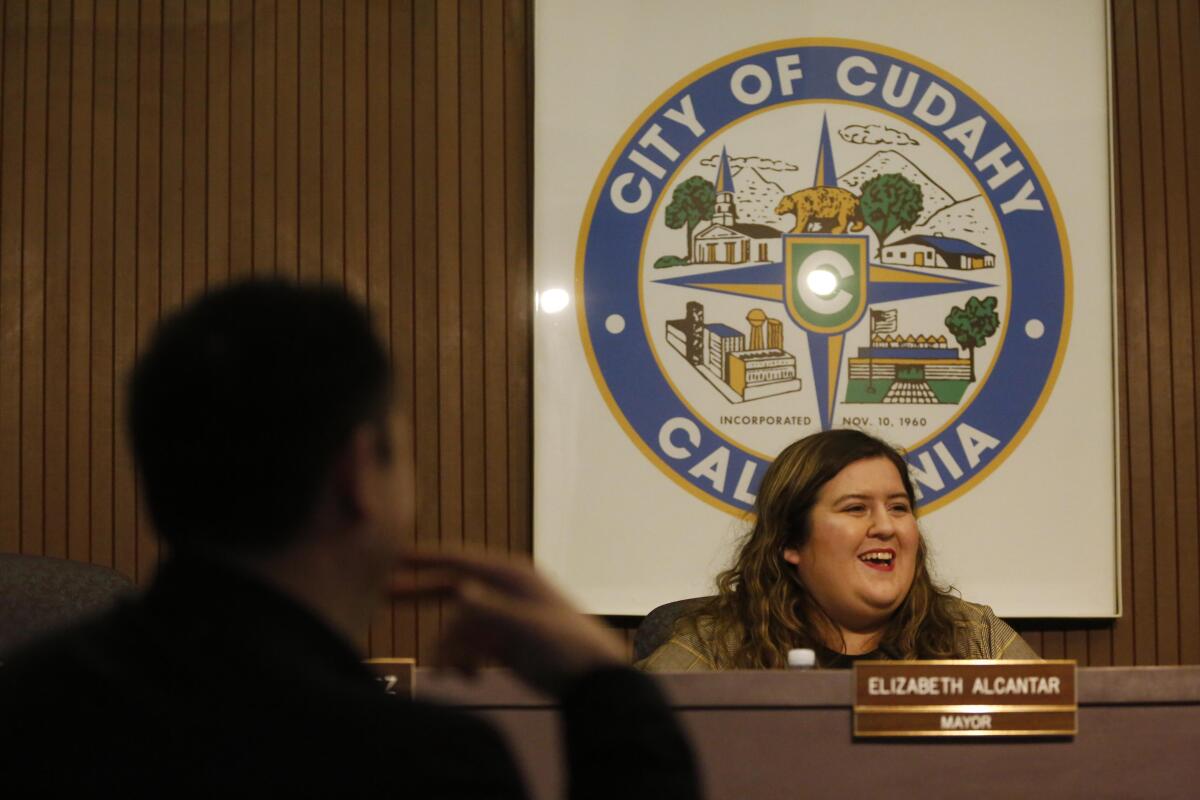
Each case study offers templates for success and cautionary tales that Latino politicians, activists and voters everywhere should commit to memory — and non-Latinos too.
Pomona College politics professor Sara Sadhwani, who served on the California Citizens Redistricting Commission that drew up district lines in 2020 for the state’s congressional, legislative and Board of Equalization seats, said the issue of how Latino political power is playing out in Los Angeles matters because the city is “attempting to have a truly multiracial, multiethnic democracy. The issues we see here today with communities of color each making legitimate claims for representation, we’ll see more of these struggles in other cities.”
“So goes California,” Sadhwani concluded, “so goes the nation.”
Better yet: So goes Latino political power in L.A., so goes L.A. Which way will we go?
More to Read
Sign up for Essential California
The most important California stories and recommendations in your inbox every morning.
You may occasionally receive promotional content from the Los Angeles Times.
